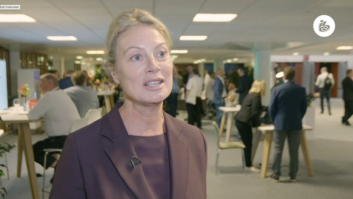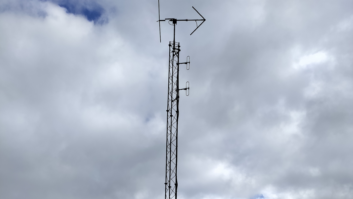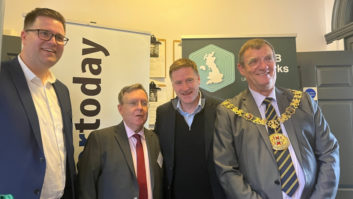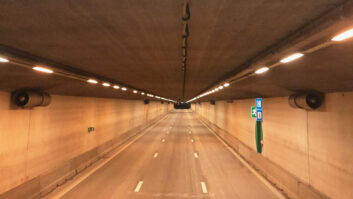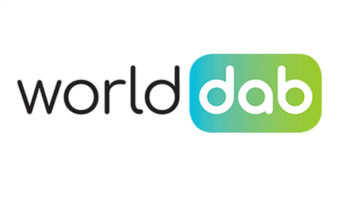
A small-scale DAB prototype system is under test at Ofcom’s
Baldock monitoring station. Photo by Lawrie Hallett
Norfolk, England — In June, the United Kingdom’s broadcast regulator Ofcom gave the go-ahead for a series of 10 public trials of low-cost, small-scale, DAB across the country.
The trials will carry a range of community-based services and commercial stations, initially for a period of nine months, operating through into early 2016.
For some time now Ofcom has been exploring new ways of delivering DAB services in a form that would be more cost-effective for small-scale broadcasters. Existing multiplexes in the U.K. are typically owned by a third-party technical service operator, which provides transmission facilities on a for-profit basis to individual broadcast stations and radio groups.
DECLINING COSTS
Contracting out technical support to a third party in this way has its advantages, but inevitably comes at an added cost for the broadcaster. Even when scaled down for reduced geographical coverage, this traditional approach is still considered by many operators to be too high for their smaller scale commercial or community-based, not-for-profit, operations.

Taking a software radio-based approach, building on previous work by organizations such as Open Digital Radio and the European Broadcasting Union, Ofcom first trialled a single transmitter software-based DAB system, in Brighton, during late 2012.
Although these earlier tests proved that the basic system could work reliably, there were elements of the prototype system that required more work in order to meet the operational requirements of professional broadcasting. Since then considerable technical improvements have been made, for example in the area of single-frequency network operations, using multiple transmitters at diverse locations to enhance coverage.
Taking such a software-based approach has resulted in the capital costs of DAB installations being dramatically lower than was previously the case when using traditional bespoke hardware implementations. Typical costs of a software-based multiplexer, transmitter, filters and antenna for a simple single-site installation are now estimated to total only around £6,000 (under US$10,000).

Because Ofcom is evaluating low-cost approaches to DAB delivery on a time limited basis, even with such minimal capital outlays being required, the regulator felt it uneconomically viable to ask potential operators to invest in equipment that might only be used for a brief period of time.
However, due to the fact that the proposals for these trials fit neatly with government objectives to promote the uptake of digital broadcasting technologies, most of the capital infrastructure costs for these trials have been covered by the Department of Culture Media and Sport, the U.K. government’s ministry responsible for broadcasting policy.
INDUSTRY DEMAND
When, in 2014, Ofcom first proposed additional trials of small-scale DAB, the intention was that these would take place at only three locations. The increase to 10 came as the result of industry pressure in response to a consultation by the regulator.
Increasing the number of trial installations not only allows the regulator to gain more real-world experience of the operations of software-based DAB transmission systems, but it also provides opportunities to test more complex operations such as SFN systems and on-channel repeaters.
As well as the various single transmitter systems being used, the trials operated by U-DAB in London and Scrimshaw’s Information Directories in Glasgow will both broadcast via a two transmitter SFN.
Meanwhile in Cambridge, the trial operated by UK Radio Developments (UKRD) will employ an on-channel repeater to fill specific gaps in predicted coverage from the main transmitter.
Technical developments aside, Ofcom has also been considering longer-term approaches to licensing a new smaller tier of DAB services. Part of the reason for running a diverse range of trials is therefore to explore alternative operating structures and financial models.
For example, local community radio service, Angel Radio is operating the trial in Portsmouth (Hampshire). Conversely, small-scale commercial radio operator, Brighton and Hove Radio is managing the tests along the coast in Brighton (Sussex).

Meanwhile, a separate not-for-profit company (Future Digital Norfolk), set up specifically to operate small-scale DAB facilities in the East of England trials in Norwich (Norfolk), is managing tests in that city.
ADDING CAPACITY
Another justification for completing these trials is the degree to which demand for small-scale broadcasting opportunities continues to outstrip supply. With analog (FM) spectrum now filled to capacity in most urban and suburban locations across the U.K., small-scale DAB offers the potential to help redress the balance, by improving supply-side capacity.
According to Ofcom, “If the trials are successful, U.K. listeners could benefit from hundreds more local and community radio stations on digital radio in the future.”
Across the 10 DAB trials, some 60 individual radio services are to be broadcast. This means an average of six services per multiplex, an occupancy rate notably below the average number of services carried on the majority of established multiplexes.
For example, the national BBC multiplex typically carries between nine and 12 services, (depending on programming demands). The lower number of services carried provides opportunities for broadcasts at higher bit rates, improving audio quality as a result.
“Because we’re a not-for-profit company, using low bit rates to squeeze in as many services as possible is not our objective,” said Mike Stonard, Future Digital Norfolk’s managing director. “We believe that listeners appreciate high-quality audio. All of our permanent services will typically operate at between 128 and 192 kbps.”
Ofcom granted licences mid-June and gave operators a maximum of 12 weeks to launch their respective trial services. Installations were carried out by individual licence holders, typically with the aid of third-party engineering support and input from Ofcom engineers.
Each of the multiplex operators reports to Ofcom on a regular basis and the regulator is also running a series of its own independent technical compliance checks, for example to ensure that reception of existing DAB services is not impacted by receiver overload or ACI (adjacent channel interference) close to any of the new transmission sites.
Ofcom is expected to make a decision on how best to move forward with long-term small-scale DAB licensing after the trials are completed in 2016.
Lawrie Hallett reports on the industry for Radio World from Norfolk, England.





